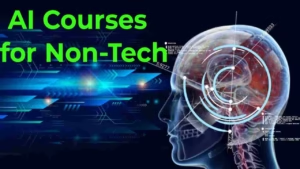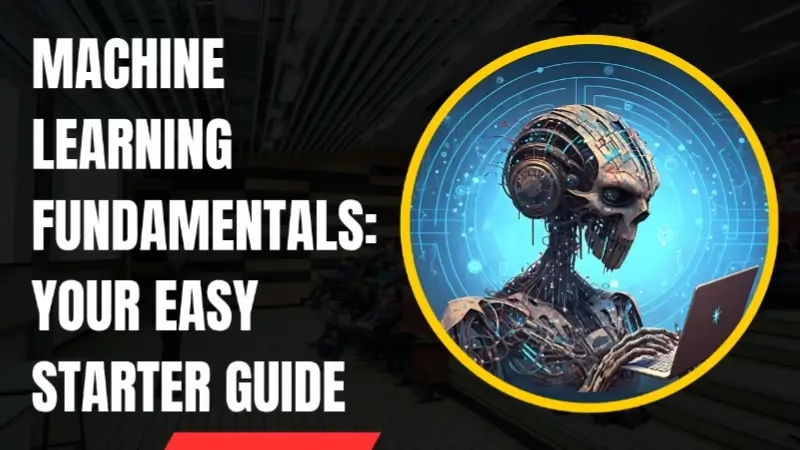AI Courses for Non-Tech: Empower Your Future Today
Discover top free AI courses for non-tech professionals. Learn how these courses can boost your career, enhance skills, and open new opportunities—all explained in simple human English.
SEO URL:
/ai-courses-for-non-tech
AI Courses for Non-Tech: Empower Your Future Today
Imagine unlocking new career opportunities without needing a tech degree. Many non-tech professionals feel left behind in today’s digital world, wondering how to gain crucial AI skills without an extensive technical background. AI courses for non-tech offer a pathway to mastering essential concepts, boosting career prospects, and understanding the transformative power of artificial intelligence—all through free and accessible learning resources. Whether you’re a marketer, business leader, educator, or simply curious about AI, this guide will help you navigate the world of free AI courses tailored for non-tech professionals. We’ll explore why you should consider these courses, the benefits they offer, top recommendations, practical tips for success, and real-world impact—all in simple, clear language.
1. Why Non-Tech Professionals Should Consider AI Courses
In today’s technology-driven environment, AI is no longer limited to programmers or data scientists. Non-tech professionals—from managers to creative workers—can benefit immensely from learning about artificial intelligence.
Key Reasons to Embrace AI Courses for Non-Tech:
- Career Advancement: Gain skills that are increasingly in demand across industries.
- Better Decision Making: Use AI insights to drive strategic decisions in marketing, finance, and operations.
- Enhanced Productivity: Leverage automation tools and data analysis to streamline tasks.
- Competitive Edge: Stay ahead of the curve in a rapidly evolving digital landscape.
Understanding these benefits can help you see why free AI courses for non-tech are essential for personal and professional growth.
2. Benefits of AI Courses for Non-Tech Professionals
Learning AI as a non-tech professional may seem daunting, but the benefits are far-reaching. Here are some major advantages:
Career Growth and Opportunities
- Increased Employability: Employers value employees who can understand and apply AI concepts, even without a technical background.
- New Job Roles: Roles such as AI project managers, business analysts, and digital strategists are emerging, bridging the gap between technology and business.
- Better Communication: Understanding AI helps you communicate effectively with technical teams.
Personal Development
- Critical Thinking: Learning AI encourages problem-solving and analytical thinking.
- Innovation: Gain the tools to innovate in your field, from creating smart marketing strategies to automating routine tasks.
Cost and Time Efficiency
- Free Learning Resources: Numerous free AI courses for non-tech professionals make learning accessible and affordable.
- Flexible Learning: Online courses allow you to learn at your own pace, fitting education into your busy schedule.
According to a study by McKinsey & Company—which highlights the value of AI skills across various industries—non-tech professionals who learn AI can significantly boost their career prospects and productivity.
3. Types of AI Courses for Non-Tech Professionals

There is a variety of courses available that cater specifically to non-tech learners. These courses are designed to break down complex AI concepts into easy-to-understand lessons.
Foundational Courses
- Introduction to AI: These courses cover basic concepts like machine learning, neural networks, and data analysis.
- Ethics in AI: Understand the societal and ethical implications of artificial intelligence.
- AI for Business: Learn how AI is applied in real-world business scenarios.
Specialized Courses
- AI in Marketing: Explore how AI tools can optimize marketing strategies and customer engagement.
- AI in Finance: Understand risk management, fraud detection, and data-driven decision-making in finance.
- AI in Healthcare: Discover how AI is transforming patient care, diagnostics, and medical research.
Practical and Applied Learning
- Case Studies: Courses that focus on real-world applications and success stories.
- Interactive Workshops: Hands-on sessions where you can practice using AI tools and platforms.
Below is a table summarizing different types of AI courses for non-tech professionals:
Table source: Adapted from course listings on leading educational platforms.
4. Top Free AI Courses for Non-Tech Professionals
Here, we highlight some of the best free AI courses for non-tech that are widely accessible and highly rated:
4.1 AI For Everyone by Andrew Ng
This course is one of the most popular free AI courses for non-tech professionals. It covers:
- Basic concepts of AI
- Applications in various industries
- Ethical considerations and real-world case studies
For more details, visit Coursera.
4.2 Elements of AI
Developed by the University of Helsinki, this course is designed to make AI accessible to everyone. It includes:
- Simple explanations of complex topics
- Interactive exercises and quizzes
Check out the Elements of AI website for enrollment details.
4.3 Introduction to Artificial Intelligence (AI)
Offered by platforms like edX, this course provides:
- An overview of AI history and evolution
- Practical applications and future trends
For more insights, visit edX.
4.4 AI in Business
For professionals interested in applying AI to business, this course focuses on:
- Strategic implementation of AI
- Case studies in various sectors
Visit FutureLearn for more information.
These courses are highly beneficial for non-tech professionals seeking to understand AI without requiring deep technical knowledge.
5. How to Select the Optimal AI Course for Your Unique Goals.
With so many options available, selecting the best course can be overwhelming. Here are some practical tips:
Identify Your Goals
- Career Advancement: If you aim to enhance your professional skills, choose courses that focus on business applications of AI.
- Personal Development: For general knowledge and personal growth, opt for foundational courses that explain basic AI concepts.
- Industry-Specific Needs: If you work in a specific industry, consider specialized courses that target your field.
Evaluate Course Content and Structure
- Simplicity: Look for courses that use simple, clear language and avoid technical jargon.
- Interactive Elements: Courses with quizzes, case studies, and hands-on projects can enhance learning.
- Instructor Credentials: Check the background and expertise of the instructors to ensure quality content.
Consider the Learning Platform
- User Reviews: Read feedback from other learners to gauge the effectiveness of the course.
- Accessibility: Ensure the course is accessible on multiple devices, including mobile.
- Certification: Some courses offer certificates upon completion, which can be valuable for your resume.
For more tips on selecting online courses, visit Aixplore Tech for expert advice and recommendations.
6. Tips for Success in Learning AI for Non-Tech
To maximize your learning experience with AI courses for non-tech, consider the following strategies:
Create a Study Schedule
- Consistency: Dedicate specific times each week for studying.
- Breaks: Schedule short breaks to maintain focus and prevent burnout.
- Review: Regularly revisit material to reinforce your understanding.
Engage with the Community
- Forums and Groups: Join online communities related to AI and your course subjects.
- Peer Discussions: Collaborate with fellow learners to share insights and troubleshoot challenges.
- Webinars: Participate in webinars and live sessions for additional learning opportunities.
Utilize Supplementary Resources
- Books and Articles: Enhance your understanding with recommended readings and research papers.
- Videos and Tutorials: Watch instructional videos on platforms like YouTube for visual explanations.
- Practice Projects: Apply what you learn through practical projects or simulations.
“Learning is a continuous journey. The more you engage with the material and community, the more valuable your experience will be.”
— Anonymous Learner
Track Your Progress
Maintain a learning journal or utilize digital tools to monitor your progress, and make sure to celebrate every small win to keep your motivation high.
7. Real-World Impact of AI Skills for Non-Tech Professionals
The skills you gain from AI courses for non-tech can have a transformative impact on your career and personal growth. Here are some ways these skills translate into real-world benefits:
Enhanced Job Performance
- Better Decision Making: Understanding AI helps in interpreting data and making informed decisions.
- Efficiency Gains: Automate repetitive tasks, freeing up time for strategic work.
- Innovation: Apply AI insights to develop creative solutions and improve processes.
New Career Opportunities
- Emerging Roles: Positions like AI project managers and digital strategists are increasingly in demand.
- Cross-Functional Skills: Combining AI knowledge with your domain expertise can set you apart in the job market.
- Competitive Advantage: Organizations value employees who can bridge the gap between technology and business.
Personal Empowerment
- Self-Learning: Acquiring new skills boosts confidence and fosters a growth mindset.
- Networking: Connect with professionals and experts in AI, expanding your career network.
- Future-Proofing: As AI continues to evolve, having a foundational understanding will be an invaluable asset.
For insights into how AI is reshaping careers, visit Forbes for articles on the future of work and technology.
8. Challenges and Solutions for Non-Tech AI Learners
While AI courses for non-tech are designed to be accessible, you might encounter some common challenges. Here are a few along with practical solutions:
Challenge 1: Overcoming the Fear of Technology
- Solution: Start with beginner courses that break down concepts into simple terms. Understand that AI is a tool for everyone, not just tech experts.
- Tip: Watch introductory videos and join communities where beginners are encouraged.
Challenge 2: Staying Motivated
- Solution: Set clear, achievable goals and celebrate small milestones.
- Tip: Form study groups or buddy systems to maintain accountability.
Challenge 3: Integrating Learning with Work and Life
- Solution: Create a realistic study schedule that fits your daily routine. Use mobile-friendly courses to learn on the go.
- Tip: Use reminders and digital calendars to keep track of study sessions.
Challenge 4: Understanding Complex Concepts
- Solution: Supplement your learning with additional resources such as infographics, simplified guides, and interactive tutorials.
- Tip: Don’t hesitate to ask questions in online forums or during live sessions.
For more strategies on overcoming learning challenges, check out Harvard Business Review for expert advice on continuous education.
9. Future Trends in AI Education for Non-Tech Professionals
The field of AI is evolving rapidly, and the future of AI courses for non-tech looks promising. Here are some trends to watch:
Increased Accessibility and Affordability
- Trend: More free and low-cost courses are being developed, making AI education accessible to everyone.
- Impact: Non-tech professionals will have greater opportunities to learn and apply AI in their fields.
Integration of Interactive and Adaptive Learning
- Trend: Future courses will use AI to personalize learning experiences, adapting content based on individual progress.
- Impact: This will improve retention and make learning more engaging and effective.
Collaboration Between Academia and Industry
- Trend: Partnerships between educational institutions and companies will lead to courses that are both practical and cutting-edge.
- Impact: Learners will gain skills that are directly applicable to real-world challenges.
Emphasis on Ethical and Responsible AI
- Trend: Courses will increasingly cover ethical considerations, ensuring that learners understand the broader impact of AI.
- Impact: This knowledge is essential for responsible AI application in various sectors.
For the latest trends in AI education, visit MIT Technology Review for up-to-date research and analyses.
10. Recommended Resources and Tools
Here’s a list of recommended resources to further your learning journey in AI courses for non-tech:
Online Learning Platforms
- Coursera: Offers courses like “AI For Everyone” by Andrew Ng.
Link: Coursera – AI For Everyone - edX: Provides courses on AI basics and its applications.
- FutureLearn: Features a range of AI and digital transformation courses.
Free Course Providers
- Elements of AI: A free online course designed for beginners.
Link: Elements of AI - Google AI: Offers various free resources and tutorials.
Books and Articles
- “Artificial Intelligence: A Guide for Thinking Humans” by Melanie Mitchell:
A great book that explains AI in simple terms for non-experts. - Online Articles: Explore resources like Forbes and Harvard Business Review for the latest trends and expert insights.
Community and Forums
- Reddit: Join subreddits like r/MachineLearning and r/Artificial for discussions.
- LinkedIn Groups: Participate in groups focused on AI and digital transformation.
For more in-depth resources on smart home and technology, visit Aixplore Tech for expert tips and guides.
11. Frequently Asked Questions (FAQ)
Q1: What are AI courses for non-tech?
A: AI courses for non-tech are educational programs designed to introduce artificial intelligence concepts in a simple and accessible manner, specifically for individuals without a technical background.
Q2: Are these courses really free?
A: Many reputable platforms offer free courses, such as “AI For Everyone” on Coursera and the Elements of AI course. Some may offer optional paid certificates.
Q3: Who should take these AI courses?
A: These courses are ideal for professionals, managers, marketers, educators, and anyone interested in understanding how AI can be applied in various fields without needing deep technical expertise.
Q4: How long do these courses typically take?
A: The duration varies; some courses may take a few weeks with a few hours per week, while others can be self-paced.
Q5: What practical benefits can I expect from learning AI?
A: Benefits include improved decision-making, career advancement, better understanding of data analytics, and the ability to leverage AI tools in your field.
Q6: Where can I find more resources on AI for non-tech?
A: For more information, visit high-authority sites like MIT Technology Review and Aixplore Tech for expert insights.
12. Conclusion and Call to Action
The rise of AI is reshaping every industry, and even non-tech professionals can benefit from understanding its core concepts. AI courses for non-tech provide accessible, free resources that empower you to harness the power of artificial intelligence. Whether you’re looking to boost your career, innovate in your field, or simply stay informed about the latest technology trends, these courses are a valuable investment in your future.
Take the first step towards demystifying AI today. Explore the recommended courses, join learning communities, and integrate these insights into your work. The knowledge you gain will not only enhance your professional skills but also enable you to drive innovation in your organization.
Call to Action:
Ready to embrace the future with free AI courses for non-tech professionals? Visit Aixplore Tech for more expert guides and tips on leveraging AI in your career. Subscribe to our newsletter for regular updates on new courses, success stories, and practical advice. Share your learning journey in the comments below and join our growing community of forward-thinking professionals. Empower yourself with AI knowledge and transform your future today!
This comprehensive guide on AI courses for non-tech has provided detailed, actionable insights into how you can start learning AI without a technical background. With benefits ranging from career advancement to personal growth, these free courses offer a practical and accessible way to gain valuable skills. Embrace the opportunity to learn, innovate, and transform your professional journey with AI.


